









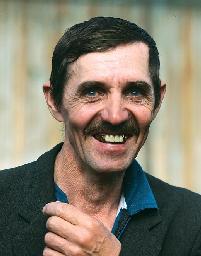 Thus, the expedition participants bade farewell to the “Republic of Yanov
Stan” and set off again, further downstream the Turukhan River.They stopped for
a short while on the left bank, in order to take pictures of a few technical
relicts of Stalin’s Railroad, completely overgrown by brushwood and weeds – a
bridge and a drainage ditch, to be more precise: what had remained of them. And
this was not really much.
Thus, the expedition participants bade farewell to the “Republic of Yanov
Stan” and set off again, further downstream the Turukhan River.They stopped for
a short while on the left bank, in order to take pictures of a few technical
relicts of Stalin’s Railroad, completely overgrown by brushwood and weeds – a
bridge and a drainage ditch, to be more precise: what had remained of them. And
this was not really much.
Once again it was hard to believe that some time in the past, locomotives and railway cars had clattered over these track junctions, that they had passed a territory which was now entirely savaged and deserted. And by no means at all anybody would be able to believe that here of all places life was to flare up again.
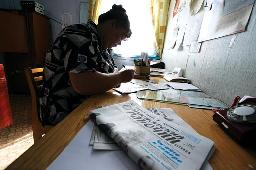 It seemed to us as if we got farer and farer away from the “Road of Death”,
although, at the same time, it did not stop attracting our attention. Even in
backword Farkovo, where scientists and journalists arrived in the early morning,
its omnious existence was clearly perceivable.
It seemed to us as if we got farer and farer away from the “Road of Death”,
although, at the same time, it did not stop attracting our attention. Even in
backword Farkovo, where scientists and journalists arrived in the early morning,
its omnious existence was clearly perceivable.
I will get back to this point a little later.
The village situated on top of a hill, astounded us at once, for there were neither blackflies nor woodlouses, but unbelievable quantities of firewood instead – trunks, little logs and little pieces of wood, which lay about all over the embankment, scattered to the four winds. You could have the impression that all this wood was not just meant for one winter and only for this hamlet, but that it was subject to being supplied continuously.
Vladimir Roman (to be stressed on the first syllable) is one of those, who keep these supplies coming. This is his area - the area where he chops his wood, not far from the spring. He usually works for a while, pauses for a moment to drink the ice-cold water, which he deems for better than any mineral water in the world. And he also gave us the advice to taste it, which we immediately did by filling all available empty jars with water from the “Khan-Kul”.
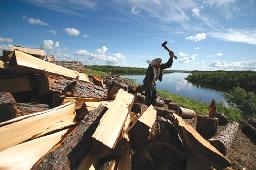 For one cubic meter of firewood they pay Vladimir 300 rubles. If he would
receive this amount just for sawing and chopping, he would, in fact, be a rich
man according to the imaginations prevailing in this place; and, apart from this,
he would dispose of a lot of free time! However, the supply of firewood turns
out to be much more complicated. At first, the trees have to be cut down;
afterwards, the logs have to be transported to Farkovo, hauled to the sloping
bank. And only then he can start sawing and chopping them. Moreover, you have to
consider that Volodya is forced to work with only one hand. He knows best about
what such hard labour means to an invalid. And, of course, his mother, Tamara
Danilovna, with who he has been living in this little, dilapidated hut for many
years, is aware of this fact, as well.
For one cubic meter of firewood they pay Vladimir 300 rubles. If he would
receive this amount just for sawing and chopping, he would, in fact, be a rich
man according to the imaginations prevailing in this place; and, apart from this,
he would dispose of a lot of free time! However, the supply of firewood turns
out to be much more complicated. At first, the trees have to be cut down;
afterwards, the logs have to be transported to Farkovo, hauled to the sloping
bank. And only then he can start sawing and chopping them. Moreover, you have to
consider that Volodya is forced to work with only one hand. He knows best about
what such hard labour means to an invalid. And, of course, his mother, Tamara
Danilovna, with who he has been living in this little, dilapidated hut for many
years, is aware of this fact, as well.
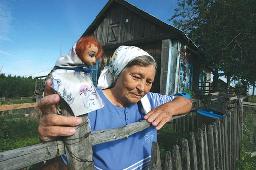 The interior of the hut does not give any dowdy impression at all. And if you
pass by it, it immediately catches your eye: there is a mechanism made of
polyethylene bottles in different colours to drain off undesirable water, and
the batten fence is decorated with – dolls. All this reflects Tamara Danilovna
Roman’s quaintness. She worked for the club in earlier times. Her husband was
responsible for cultural life,and his wife used to assist him in everything. Her
husband passed away a long time ago, and although the club building looks
completely decayed and today serves for nothing, she is still keeping a watchful
eye on it, the more since it is situated just about one-hundred meters away from
her own house. The club does not hold any treasures, except for an entirely
antiquated film projector. which nobody is in need of, but nonetheless she feels
responsible and obliged to attend to it. The main thing is that no fire, caused
by some act of bad faith, some deviltry, will break out and sparks will flash
over the whole village.
The interior of the hut does not give any dowdy impression at all. And if you
pass by it, it immediately catches your eye: there is a mechanism made of
polyethylene bottles in different colours to drain off undesirable water, and
the batten fence is decorated with – dolls. All this reflects Tamara Danilovna
Roman’s quaintness. She worked for the club in earlier times. Her husband was
responsible for cultural life,and his wife used to assist him in everything. Her
husband passed away a long time ago, and although the club building looks
completely decayed and today serves for nothing, she is still keeping a watchful
eye on it, the more since it is situated just about one-hundred meters away from
her own house. The club does not hold any treasures, except for an entirely
antiquated film projector. which nobody is in need of, but nonetheless she feels
responsible and obliged to attend to it. The main thing is that no fire, caused
by some act of bad faith, some deviltry, will break out and sparks will flash
over the whole village.
Tamara Danilovna of all people told us that, shortly after the war, a temporary camp was built just behind the village enclosure, to which they were taking female prisoners during the summer months. Everything had been predetermined – there were armed guards, dogs. The women were to supply hay for the farmsteads, which, at that time, were not very far away from the railroad under construction.
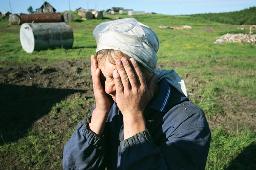 Tamara Danilovna also told us that prisoners of Stalin’s camp were always
desirous to escape … fate was very unkind to them. But where were they supposed
to escape to? There was nothing but taiga and swamps around them. The river did
not respresent any suitable escape route, either, for the prisoners, swimming
for their life, were distinguishable on the smooth surface only too well. Guards
would snipe them, and for those, who were caught again and taken back to the
camp zone, life became a true nightmare. Far the worst, however,was something
else. The authorities announced: a local who succeeds to seize an escaped
prisoner will be remunerated by a sack of flour. By the way, you did not even
have to seize him; it was enough to shoot him, cut off one of his ears - just as
a proof – and then deliver it on the sport. Among the residents of Farkovo and
other surrounding villages there were many a people – or maybe babarians, who
had no objections to exchange the life of a prisoner against a nice round loaf
of bread. But who is ready to own up to his behaviour at that time?
Tamara Danilovna also told us that prisoners of Stalin’s camp were always
desirous to escape … fate was very unkind to them. But where were they supposed
to escape to? There was nothing but taiga and swamps around them. The river did
not respresent any suitable escape route, either, for the prisoners, swimming
for their life, were distinguishable on the smooth surface only too well. Guards
would snipe them, and for those, who were caught again and taken back to the
camp zone, life became a true nightmare. Far the worst, however,was something
else. The authorities announced: a local who succeeds to seize an escaped
prisoner will be remunerated by a sack of flour. By the way, you did not even
have to seize him; it was enough to shoot him, cut off one of his ears - just as
a proof – and then deliver it on the sport. Among the residents of Farkovo and
other surrounding villages there were many a people – or maybe babarians, who
had no objections to exchange the life of a prisoner against a nice round loaf
of bread. But who is ready to own up to his behaviour at that time?
Nowadays, many live under miserable conditions, but nevertheless the situation is different from that time – this specific fright is missing and you do not feel this pressure having to denounce another person. You just do not have to act under duress. Whenever the adults have to exchange opinions, they meet on the hilly, wind-swept part of the embankment. And the young people prefer to amuse themselves on the premises of the village administration, where they have been assigned an extra ball – a discotheque. Farkovo is a village for the youth. Probably because it disposes of a boarding school frequent by children from the nearby trading posts. Hence, the children from Yanov Stan, who we said good-bye to the day before, also come here in automn. Apart from deaf-mute Polinka, who we cannot clearly classify yet.
Admittedly, the expression “nearby” is somewhat misplaced in this connection – fromSovietskaya Rechka, for example, you have to go by boat via the River Turukhan for many hours. There is no other possibility to get there, unless you decide to go by plane, but this turns out to be awfully expensive nowadays.
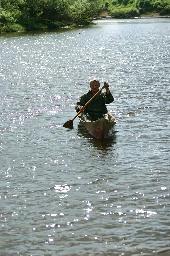 115 students attend the boarding school in Farkovo, among them 89 local
children, a fact, which proves that the village is looking ahead. And when there
is a perspective, then the village should support it. Unfortunately, they do not
always succeed in realizing their intention to the desirable extent. In spite of
decisive leaders, such as Simona Jurchenko, who heads the Turukhansk Region,
they sometimes cannot manage to carry out their plans, although you will hardly
be able to find a cabinet within the region which she has no access to.
Unfortunately, the settlements in the north do not attract much attention.
115 students attend the boarding school in Farkovo, among them 89 local
children, a fact, which proves that the village is looking ahead. And when there
is a perspective, then the village should support it. Unfortunately, they do not
always succeed in realizing their intention to the desirable extent. In spite of
decisive leaders, such as Simona Jurchenko, who heads the Turukhansk Region,
they sometimes cannot manage to carry out their plans, although you will hardly
be able to find a cabinet within the region which she has no access to.
Unfortunately, the settlements in the north do not attract much attention.
- Reforming the local self-administration would be one of the essential things to proceed with, the way how they usually tend to carry out reforms in this place is somehow – strange,- says Viktor Bichert, chairman of the village counsil, in a sad voice. He does not complain about this situation, but just states the facts. – The administrative tasks are being fulfilled by different authorities by pruning the budget at the same time. It looks as if I am responsible for everything here in Farkovo; however, what am I supposed to do with inadequate financial means? The sanitary and midwife station are controlled by a certain board, library and boarding school by other supervisory bodies. Each authority plans and starts to realize its ideas, but it would certainly not be sinful to inform the others and consult them about their projects, for we know better about what is needed in money and materials. We could even safe money for the paint to make all the repair work which is not to be delayed just by ordering the entire quantity for all local institutions at once. Why, no! They do not even want to listen to us. Instead, they ask as questions such as: why the person in charge of the heating inside the village council building is to be paid for working on Saturdays and Sondays – these are the two days of the week when he is supposed to rest. However, there is one thing they are completely unconcerned about: in the far north, upon permanent frost with extremely low temperatures, he does not enjoy any holidays at all. For this reason, their question sounds rather inconsiderate.
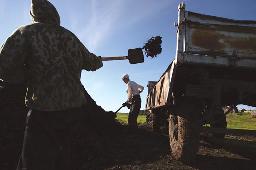 I would like to repeat once again: Viktor Kondratevich does not complain about
life, quite the contrary – he is always smiling, and never talks about all the
unpleasant circumstances and problems which become apparent in this place.
Maybe, these problems –at first sight - are just odds and ends, but only for
those who live in district towns or the regional center. Communication with the
outside world, for instance. One typical Farkovskan paradox is the fact that the
school disposes of a special computer room,the even have internet access.
Strange to say, but there is not telephone connection. The telephone set you
will find right in the office of the village council is just standing there for
reasons of importance. It is all dusty, but you see it there and gloat over it.
Unfortunately, it is good for nothing, because the automatic telecommunication
station which was built in the 1930s – burnt. The radio station is in the same
kind of state –you cannot even contact the municipality or anybody who needs to
be informed urgently in case of emergency.
I would like to repeat once again: Viktor Kondratevich does not complain about
life, quite the contrary – he is always smiling, and never talks about all the
unpleasant circumstances and problems which become apparent in this place.
Maybe, these problems –at first sight - are just odds and ends, but only for
those who live in district towns or the regional center. Communication with the
outside world, for instance. One typical Farkovskan paradox is the fact that the
school disposes of a special computer room,the even have internet access.
Strange to say, but there is not telephone connection. The telephone set you
will find right in the office of the village council is just standing there for
reasons of importance. It is all dusty, but you see it there and gloat over it.
Unfortunately, it is good for nothing, because the automatic telecommunication
station which was built in the 1930s – burnt. The radio station is in the same
kind of state –you cannot even contact the municipality or anybody who needs to
be informed urgently in case of emergency.
It would certainly be reasonable to have such a service available, for mischief and accidents may happen at any time. The school building in Farkova, for example, is in a very bad repair. The walls even had to be fixed by bolts to avoid a collapse of the building, but this measure of safety merely pulls the wool over the people’s eyes. In case the building really caves in one day,this would be a real catastrophe. They addressed a letter to Shoiga, however, they did not make the slightest progress with regard to this serious problem so far. They are now pinning all their hopes on the head of the district and the governmental authorities, who might finally be prepared to budget this important object in the coming year. They must succeed to buy and secure all necessary building materials some time in the spring. If this is not done immediately after the ice drift, no barges will come upstream the Turukhan anymore. Then they will have to risk the lives of the children for another year yet.
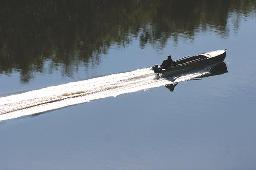 Delayed decisions make waves and cause resentment among the residents of
Farkovo. Once they were promised a saw mill; unfortunately, the missed to load
it by the time the spring was coming and despatched it in the autumn. Hence,the
barge did not reach the final destination (onset of winter) and the
prefabricated building materials were delivered to another village. Of course,
we are happy for our neighbours,but what are we supposed to do without beams and
planks?
Delayed decisions make waves and cause resentment among the residents of
Farkovo. Once they were promised a saw mill; unfortunately, the missed to load
it by the time the spring was coming and despatched it in the autumn. Hence,the
barge did not reach the final destination (onset of winter) and the
prefabricated building materials were delivered to another village. Of course,
we are happy for our neighbours,but what are we supposed to do without beams and
planks?
Another problem which has remained unsolved for years – the water supply. Somehow or other they once drilled a hole in the village; instead of achieving a drilling depth of 180 m, they advanced up to 130 meters only - and their the matter rested! The pump house has been completed – but there is not a single drop of water.
The inhabitants of Farkovo mainly live at the expense of the budget organizations, for there is no work to do – they have no jobs. They used to deal with fishing, selling the fish to the state. Nowadays, the state does not need fish anymore. There is nothing else for it but to go hunting:
it is only only too well that entrepreneur Viktor Novgorodov supplies them with everything what is absolutely necessary.He even leaves goods to them on the nod, i.e. he will be waiting for payment until they are able to deliver furs to him during the winter. Elsewise none of the men in this area would have anything to do at all.
On the day of our arrival, however, half the men were occupied on the bank – they were loading coal on a cart, which was then taken to the central heating room of the school by tractor. Earlier, they had used a fork-lift to manage this kind of work, but then, allof a sudden, the mind of somebody from the upper management of municipal housing had been crossed by the thought – to remove it. And this is what exactly happened. Now the men were pottering about with shovels from morning to night. Hard,dirty and dusty labour, but they are paid for it. Sincere thanks,as they say,to the civil servants working for the municipal housing office, who, apparently, have not done any physical labour for a long time.
And this is how the villagers of Farkovo, a likeable village situated in a pictorial place in the Far North live. They use to roll up their sleeves and get to work – strength and circumstances permitting, they learn,read newspapers and books, which, every now and then, find their way to the local library, and watch the only television program available in this isolation. They are not dreaming of the construction of the railroad, although just a railroad might be in a position to diversify the awfully boring course of life.
(To be continued…)
Vladimir PAVLOVSKIY
ON THE PICTURES: Viktor Bichert – the Tsar and God of this area, even though he takes after neither of them, for he has, in fact, lots of commitments to fulfil, but prospects and possibilities are in a bad way. Farkovo is a little village; nonetheless, the staff members of the village council have to deal with many serious problems, and things in the life of the villagers do not always flow smoothly. There is enough to complain about. Vladimir Roman’s work day isnot subject to any defined rules.He decides himself about when to start chopping wood and when to take a break or finish work. Tamara Danilovna decorates the batten fence with dolls, so that everyday life will be a little less monotonous. And to raise a smile from the others villages when they are passing by. The men do not replace the fork lift for the very first time, throwing coal into the tractor-drawn trailor from morning till night. Of course, they are doing hard labour, but it is also very difficult to find another job in the summer. Before starting to work they have to carefully rub tar into their skin, so that the blackflies will stop pestering them. They cannot always count on a good catch – sometimes there will hardly be enough fish to feed the dogs.
Photos: Aleksander KUZNETSOV
“Krasnoyarsk Labourer”, 20.08.2005